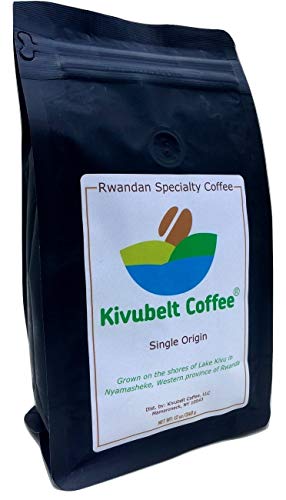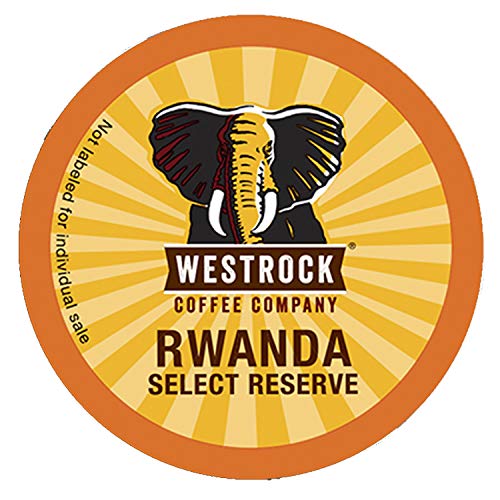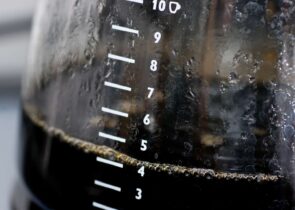When African coffee is the topic of conversation, Kenyan or Ethiopian coffee beans tend to steal the show. Strangely enough, you don’t hear much about Rwandan joe.
Compared to other coffee-producing countries, Rwanda is relatively new to the specialty coffee scene. It has had to power through some setbacks, but the country has earned a spot as one of the world’s top 30 coffee-producing countries. That makes perfect sense, as the geo-climatic conditions of Rwanda are ideal for high-quality coffee growth.
At a Glance: Best Rwanda Coffee

Quick Summary: Best Rwanda Coffee
 | Our Top Choice Joe Coffee - Rwanda Ejo Heza |
| Check Price → |
 | Sparrows Coffee - Rwanda Kivu Shores |
| Check Price → |
 | Huckleberry Roasters - Rwanda Agaseke |
| Check Price → |
 | Huckleberry Roasters - Rwanda Gasharu Natural |
| Check Price → |
 | Feast Coffee & Culture - Cyimbili Harrar |
| Check Price → |
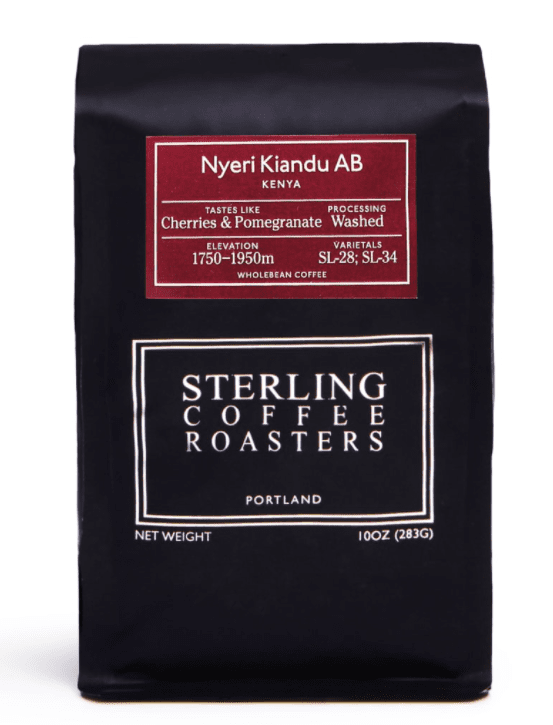 | Sterling Coffee Roasters - Rwanda Nyamasheke Mutovu |
| Check Price → |
 | Kivubelt Coffee - Rwandan Single Origin |
| Check on Amazon → |
 | Westrock Coffee Company - Rwanda Select Reserve |
| Check on Amazon → |
 | Methodical Coffee Rwanda Kanzu Lot #11 |
| Check Price → |
 | Cubico Coffee Rwanda Kopakaki Coffee |
| Check on Amazon → |
 | Kirkland Signature - Rwandan Dark Roast |
| Check on Amazon → |
Read on for the full scoop on the Rwandan coffee industry’s past, present, and future. Plus, take a look at some of our favorite Rwandan coffee beans.
Building and Rebuilding
Once upon a time, in the 20th century, — 1904, to be exact — German missionaries introduced coffee plants to beautiful, vibrant Rwanda. But from there, things were far from a fairy tale. Plant growth was slow, and even when the industry picked up in the 1930s under the exploits of Belgian colonialists, there was nothing but high-volume, low-grade coffee production.
Decades of European influence in Rwanda ultimately led to the destabilization of the sociopolitical system and catalyzed the Rwandan genocide in 1994. In just 100 days, 800,000 people were murdered, and over 250,000 women were raped.
Unsurprisingly, this event led to the collapse of many of the economic and infrastructural systems in place, including those driving the production of one of the country’s primary cash crops. Yep, you guessed it: coffee.
Following the tragic genocide, there was a need for rebuilding and improvement, and the country’s coffee industry was not exempt. As Rwanda looked toward the future, it aimed to rebuild a better joe production system focused more on high-quality beans that, with the rise of the Third Wave Coffee movement, could prove more lucrative for the economy.
Organizations like the Partnership for Enhancing Agriculture in Rwanda Through Linkages (PEARL) and Sustainable Partnerships to Enhance Rural Enterprises and Agricultural Development (SPREAD)* assisted in this process.
In the last decade, the Rwandan coffee industry has become quite an impressive economic force. The country has become the ninth-largest producer of arabica beans, and coffee is now one of the country’s largest exports, with over 450,000 small-scale farms.
Sure, Rwanda still has plenty of room to grow and recover, but the lovely country still has much to offer, especially where coffee is concerned.
*SPREAD was directed by the founder and CEO of World Coffee Research, Dr. Timothy Schilling.
Rwandan Coffee’s Current Status
Despite some of the challenges that accompany developing a coffee industry, the outlook in Rwanda is quite positive (despite what Western media outlets would lead you to believe). Over the past two decades or so, the Rwandan coffee world has seen an incredible amount of growth, not to mention the growing stability and success that have spread to other areas of the country.
In addition to the growing specialty coffee industry, there is also a push to grow coffee culture within Rwanda. As we mentioned earlier, almost all of the joe Rwanda produces is exported.
However, recent efforts by organizations like the National Agricultural Exports Board (NAEB) are moving to teach coffee farmers and locals how to brew their country’s primary crop at home. The goal is to allow Rwandan people to appreciate the quality of their products.
R’Wander into Rwandan Coffee Production
In 2021, Rwandan coffee growers produced 38,360,433 pounds of joe and brought in a whopping $78.3 million in revenue — that’s 42 percent more than the country raked in from January to December 2020.
Rwanda’s coffee production wasn’t always this high or lucrative, though. In 2000, specialty coffee accounted for zero percent of its crops, leaving only low-grade beans. However, by 2017 that number jumped to 52 percent and was projected to continue increasing until reaching more than 80 percent in 2020.
Now, 95 percent of Rwanda’s crop is the highly respected bourbon arabica coffee plant. And under the right conditions, that plant produces a great bean.
Roasty Rankings: Our Picks for the Best Rwanda Coffee
Are you ready to peruse some of the best beans this African country has to offer? We thought so. Read on to learn more about what we’ve dubbed the best-tasting Rwandan coffee!
Joe Coffee – Rwanda Ejo Heza

Joe Coffee Rwanda Ejo Heza
Super ripe, tart apple up front, with lots of baking spice and hints of chocolate.
Ejo Heza means “bright tomorrow,” making it a particularly fitting name for this Joe Coffee blend. Every time coffee drinkers see this bag of beans sitting atop their kitchen counters, they will think of the bright joe they’ll enjoy tomorrow morning. This coffee is bursting with red plum, orange blossom, and custard flavors, producing a delightfully fruity brew with a little bit of tartness.
Joe Coffee sources the Ejo Heza beans from an all-woman sub-cooperative of the same name in Rwanda’s Western Province. One dollar from every purchase is donated to the Women in Coffee Project, an initiative that highlights and celebrates the achievements of women in the coffee industry.
Sparrows Coffee – Rwanda Kivu Shores

Sparrows Coffee - Rwanda Kivu Shores
A light body and notes of black tea are accentuated by a lemonade sweetness and bright green apple acidity.
As implied by its name, this batch of beans comes to us from the banks of Lake Kivu, harvested from a lot shared by 26,000 coffee farmers. When you pair these medium roast coffee beans with your go-to brewing process, expect to end up with a drink that boasts one of the sweet, complex flavor profiles for which Rwandan joes are known.
As you sip this coffee, enjoy notes of plum and raisin, a hint of brown sugar, and a crisp floral finish. And here’s some extra peace of mind for you, Roasty reader: Arise Rwanda, a nonprofit dedicated to advancing education and development in Boneza, exports these beans. So, you can feel good knowing your purchase helps the organization improve the community.
Huckleberry Roasters – Rwanda Agaseke
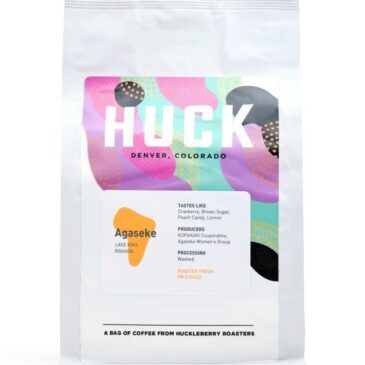
Huckleberry Roasters - Rwanda Agaseke
Juicy notes of fresh stone fruit and a splash of orange acidity work in tandem with a sugary sweetness that lingers in the background.
If you’re searching for a solid bag of beans to give to one of your coffee-loving peers, look no further than Huckleberry Roasters’ Rwanda Agaseke joe. Its name, Agaseke, comes from a traditional Rwandan basket used for gift-giving, so we’re willing to wager this stuff will make the perfect present.
These beans, full of fruity acidity and satisfying sweetness (thanks to the region’s soil quality and meticulous processing methods), are grown by the Agaseke coffee-growing group, a relatively new bunch of female farmers and part of the much larger Kopakaki co-op.
A cup of this female-produced coffee has hints of lemon, peach candy (a.k.a., those peach rings you can’t resist snagging from the gas station), brown sugar, and cranberry — talk about a sweet treat!
Huckleberry Roasters – Rwanda Gasharu Natural

Huckleberry Roasters - Rwanda Gasharu Natural
The juicy berry sweetness we so often associate with naturally processed coffees from East Africa is complemented by pleasantly tart notes of hibiscus in this delicious Rwandan cup.
While the above batch of Huckleberry Roasters Rwandan beans is wet-processed, this offering is processed via the natural process; in fact, it’s Huckleberry’s first natural coffee from this country. Most natural processed coffees sport a sweeter, fruitier flavor profile, and this one is no exception; a cup of this stuff tastes a bit like red grapes, melon, orange zest, and honey.
Though these beans were grown by smallholder farmers in Rwanda’s Nyamesheke Province, they were processed by Umuko Coffee and Gasharu Washing Station, two parts of one business. The good folks at Gasharu have been farming in Rwanda since the 1970s, so it’s pretty safe to say they’re pros at their practice.
Feast Coffee & Culture – Cyimbili Harrar

Feast Coffee & Culture - Cyimbili Harrar
Juicy lime acidity and nutty sweetness yield to a slightly drying, tea-like finish in this Rwandan cup.
California-based Feast Coffee & Culture sources the beans for the Cyimbili Harrar joe from the Cyimbili farm in Rutsiro, where coffee bean growth starts at the shore of Lake Kivu and stops at the top of a high hill. Several coffee varieties are grown there, including the rare Rwandan Harrar joe.
These beans are fairly fruity, complete with notes of dried cherry, orange, and black tea. But don’t take our word for it. Get yourself a bag of this coffee from Feast and experience the tasting notes for yourself.
Before they were packaged and shipped to your doorstep, these beans underwent a 24-hour fermentation and washing process. Then, they were roasted to a lovely light-medium level, ready to brew a pleasantly tart yet somewhat sweet cup of coffee for you to enjoy.
Sterling Coffee Roasters – Rwanda Nyamasheke Mutovu

Sterling Coffee Roasters - Rwanda Nyamasheke Mutovu
Juicy notes of fresh peach complement a zippy lime acidity and lingering, floral honey sweetness in this delicious coffee from Rwanda.
You can, of course, enjoy these African coffee beans any time of the year. But because of their sweet peachy flavors — which hit the spot, whether enjoyed black or with a splash of milk and cream — we tend to associate Sterling Coffee Roasters’ Rwanda Nyamasheke Mutovu joe with relaxing summer morning.
Coffee producers grow these beans at a pretty high altitude, somewhere between 1,800 and 1,950 feet. That’s great news for serious java lovers, as beans that are grown at higher altitudes usually create a more flavorful coffee experience. Here’s another reason to rave about this medium roast: it’s one of the highest-scoring batches of Rwandan beans Sterling has ever sold!
Kivubelt Coffee – Rwandan Single Origin
Those searching for a versatile batch of single-origin beans should keep Kivubelt Coffee’s Rwandan specialty dark roast in mind. Whether you’ll be using an espresso machine to pull a powerful shot or plan on taking it slow with a French press or pour-over, this high-quality arabica coffee does the trick.
Kivubelt Coffee, founded in 2011, grows its joe on the banks of Lake Kivu, and, thanks to the lake’s mist and the rich, volcanic soil, the result is truly excellent coffee with chocolate-tasting notes and a mild finish.
Westrock Coffee Company – Rwanda Select Reserve
K-cup lovers, rejoice! Westrock Coffee Company brings you a Keurig-friendly Rwandan offering perfect for anyone who swears by the single-serve coffee machines to provide their daily caffeine fix. These dark roast K-cups produce a brew that boasts a smoky cedar flavor, notes of black currant, and a pleasant citrus aroma (complete with hints of apple and lemon — talk about crisp and refreshing!).
These arabica beans hail from the nation’s Karongi district. Once handpicked, the coffee is roasted to dark, bold perfection. Plus, they’re ethically sourced and kosher-certified!
Methodical Coffee – Rwanda Kanzu Lot #11

Methodical Coffee Rwanda Kanzu Lot #11
This cup’s velvety smooth, yet gentle, tea-like body showcases a cherry sweetness and a soft limeade acidity.
One of the first words that come to mind when we think of these premium coffee beans from Methodical Coffee is gentle, but don’t let that fool you into thinking these beans can’t give you a peppy pick-me-up when you need it most!
Methodical Coffee’s Rwanda Kanzu Lot #11 java is known for its smooth, tea-like body, but the medium-roasted beans will still give you the strong, high-quality flavor you expect from your cup of coffee. The beans, which are sun-dried after being harvested, have notes of black tea, cherry, and figs that come together to create a tart and sweet brew.
Cubico Coffee – Rwanda Kopakaki Coffee
Cubico Coffee’s Rwanda Kopakaki joe is grown in the Karongi District. More than 800 farmers here pooled their knowledge — and, of course, the harvests from their coffee plantations — to create Kopakaki, a cooperative dedicated to producing high-quality, premium coffee beans anyone would be proud to load into their brewing method of choice.
These arabica beans (of the bourbon coffee variety) are a lovely City roast, and they produce a brew that bears a full body with notes of black tea and limeade. There’s even a wine-like finish and bold aroma.
Kirkland Signature – Rwandan Dark Roast
Stock up on Rwandan coffee beans on your next Costco run with Kirkland Signature’s dark roast. And when we say stock up, we mean resist the urge to buy in bulk and only get what you need; nothing’s more disappointing than beans going stale before you have a chance to brew them.
This joe is grown on one of Rwanda’s high-altitude family farms, and the coffee thrives because of the area’s mild temperatures and ideal precipitation levels. Once brewed, these beans — heated to a dark roast level, by the way — have a medium body, chocolate and citrus-tasting notes, and a jasmine-like aroma.
Rwandan Coffee Regions
Rwandan coffee-growing regions tend to have nice, high altitudes with nitrogen-rich volcanic soil. There are five main areas for coffee production:
- Virunga
- Kivu
- Kizi Rift
- Akagera
- Muhazi
The main districts across Rwanda that participate in the coffee industry are Gakenke, Rutsiro, Karongi, Nyamasheke, Nyagatare, Kamonyi, Kayonza, Ngoma, Kirehe, Nyamagabe, and Huye. You can still detect plenty of variety and complexity within these areas, so pinning down specific regional profiles with Rwandan coffee beans is difficult.
What makes Rwandan coffee special?
Growing Conditions
To understand these African coffee beans, you need to know where and how it’s grown. The Rwandan coffee gaining global recognition for its high quality is generally from farms located on mountainsides between 5,200 and 6,500 feet above sea level.
Most Rwandan coffee farms are still in the 4,000 and 6,000-foot range. The high altitudes, volcanic soil, plentiful sunlight, and equatorial mists favor the growth of arabica coffee beans. The plants flower in September and October and are processed from March to July.
Wet Processing
In Rwanda, the vast majority of the beans are fully wet-processed. Though this is a more recent development, this process is largely responsible for increased production volume and quality.
Unlike in other parts of the world, Rwandan washing stations aren’t linked to massive coffee estates that process everything in-house. Instead, these washing stations cater to many smaller coffee growers who often grow joe in addition to other crops.
Wet processing, also called fully washed or double washed, involves soaking the beans twice and is more widespread in Africa than in other regions like Latin America. Wet processing is best suited for more complex beans and is responsible for the noticeably clean, bright, and fruity flavors for which Rwandan coffee is known.
Taste
Sure, we’ve told you how it’s grown and processed, but the million-dollar question remains: how does Rwandan coffee taste?
Rwandan coffee tastes deep and complex, and you can expect each cup to have a rich, creamy body with a buttery overtone and aftertaste with notes of sweet caramel. Your taste buds will delight in the joe’s bright, citrus flavor and fruit or floral notes.
That’s just the baseline, though. On top of that, Rwandan coffees often introduce several layers of complex flavors. So, as you sip your cup of coffee, you could be surprised with anything from notes of clove and cinnamon to nuttiness and white chocolate. Your Rwandan beans may even boast hints of dates or plums.
And though the taste is important (and it is very important, dear coffee lover, but you already know that), we can’t forget to mention how this joe smells. Typically, Rwandan beans sport an aroma of lemons and orange blossoms.
How to Buy Rwandan Coffee
Because of the challenges the Rwandan coffee industry (and the country as a whole) have faced, the best buying practices for coffee apply especially strongly to Rwandan products. You may have noticed that many big, well-known coffee brands like Volcanica and Coffee Bean Direct don’t sell beans from this region.
The coffees listed above are among the more easily accessible options from brands that aim to source their products ethically. However, getting many Rwandan coffees means buying from smaller companies and doing some digging to be sure they aren’t exploiting their workers.
Keep an eye out for brands with sustainability programs and certifications like Fair or Direct Trade. These systems aren’t perfect, but they generally indicate some attempt to encourage socially and environmentally sustainable practices. These two facets are incredibly important to the future success of the Rwanda coffee industry.
How to Brew Rwandan Coffee
Now that you know how to source your Rwandan coffee, it’s time to talk about the best ways to brew it when it arrives. After all, you don’t want to risk missing out on the joe’s silky texture and to-die-for natural flavors.
When deciding which brewing method is best, keep espresso machines and drip coffee brewers (specifically pour-overs) in mind. Ultimately, the choice is yours, but consider the joe’s roast level and flavor profile as you ponder brewing processes.
For example, if you treated yourself to a dark roast with strong, rich overtones, reach for your tamper and espresso machine and prepare to pull a shot. If you’re brewing beans with more intricate, delicate flavors, go for a Chemex or some other pour-over tool to get the most out of your joe’s taste.
Wrapping Up
Rwanda might be small, but its coffee is a big deal. So, if you’re looking for beans that will surprise you with their depth and hail from a region that has enough flavor variety to impress any set of tastebuds, Rwandan joe should be on your must-try list.
Thanks to Rwandan coffee trees’ optimal growing conditions and the wet method used to process them, these beans have a lot going for them. Plus, the commitment to producing quality coffee at both a local and national level effectively boosts the success of the industry.
As always, look for ethically sourced joe. Direct and Fair Trade labels are always great, but don’t forget to do some sleuthing beyond the surface level, regardless of the coffee company you’re considering; you don’t want to get swindled by cheap low-quality coffee.
Despite the lack of coverage and recognition, Rwandan coffee deserves to be seen and appreciated both domestically and internationally. So, keep your eyes peeled for this java, as its beans — and the country as a whole — will probably surprise you.
Happy Caffeinating!

